Get posts by email
Finding Home ~ The conclusion
May 9, 2023
This is the final piece of an essay divided into four parts for easier blog reading.
You can read the entire essay in pdf version here.
I’ve also produced an audio recording of the complete piece. It’s 1 hour long.
↓ Audio recording of essay↓
Conclusion from the last installment of the essay:
Living in Montreal with no family, no mountains and no purchase of a property to anchor us, the question of “where is home” became insistent, especially after I lost the religious beliefs my childhood.
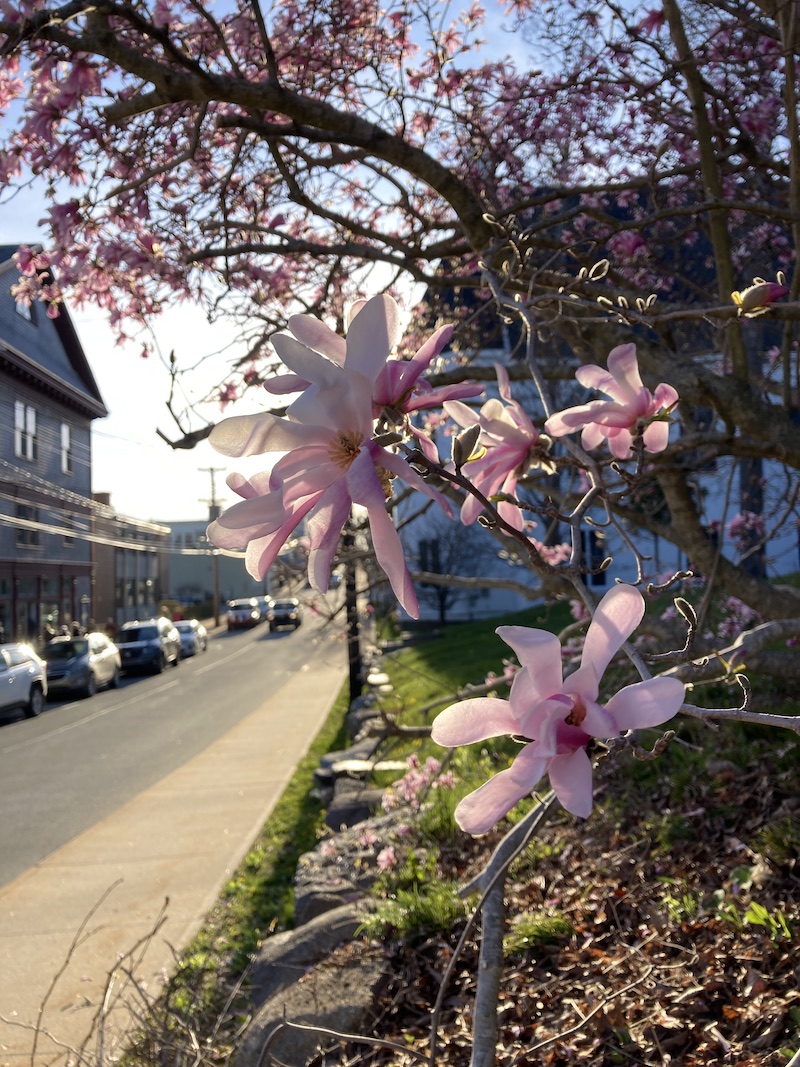
late April in downtown Lunenburg, NS
Revelations
Five years ago, I was seeing a Spiritual Director for a while. My faith was in active crumble mode, and I was wondering what, if anything, would be left. The kids were teenagers, and I was wrapping up my years as a homeschool parent, trying to figure out what to do with my life post-childraising. We were losing the house in Maine. We were in a financial crunch.
I really needed a whole support team, including a financial advisor, a therapist, and a career counsellor. But the Spiritual Director was free.
I meditated in those days to help manage my anxiety and as part of my spiritual direction exercises. During one of those late winter meditations, I had a vision of my fundamental interconnectedness to the entire Earth and to the Cosmos. I was inextricably connected to everything else, regardless of where I lived.
Home was here - wherever I was - in my body, on Earth, connected to all things.
By calling it a vision or revelation, I don’t want to overstate its metaphysical nature or amplify its meaning for anyone else but me. It was a knowing. And it still is.
I remember the season acutely because my grandmother died that spring, and the knowledge of my connectedness helped carry me through that loss. I would always remain connected to my grandmother and family, regardless of distance or shared beliefs.
Revelations can be lost or diminished. Our interpretation of them can change. If a revelation is helpful to our spirits, it needs to be remembered. And so I keep that particular knowing close because I don’t want to forget it.
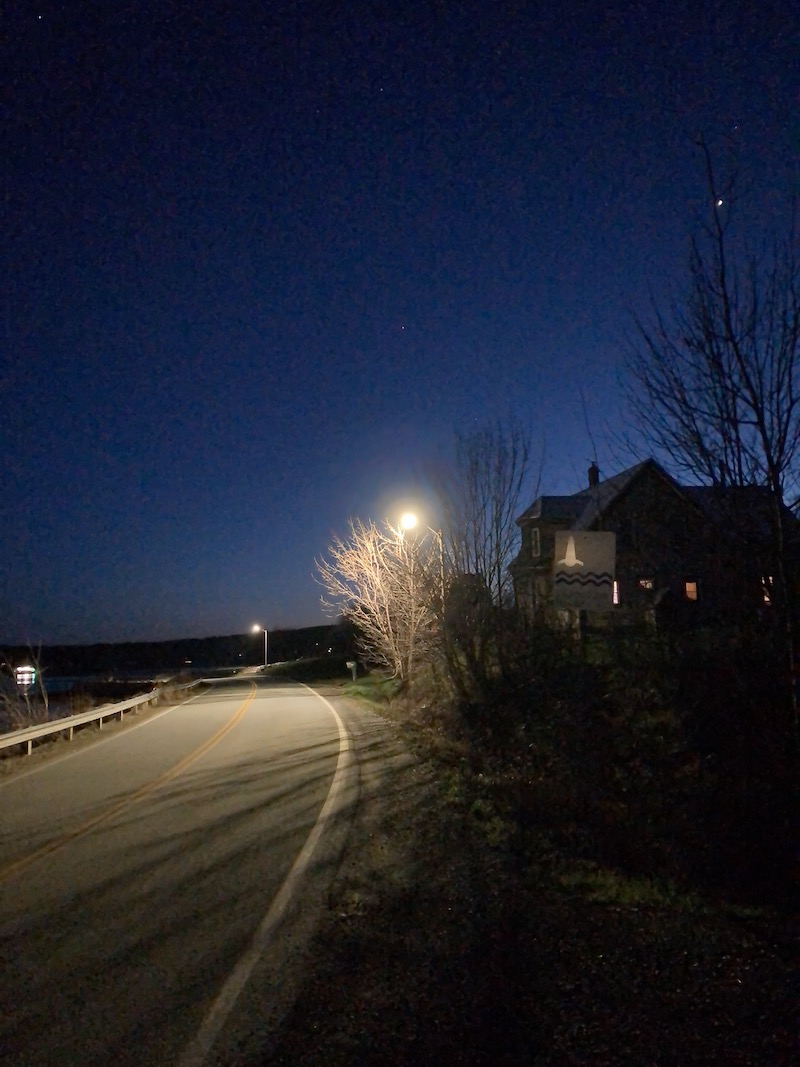
our road in Nova Scotia, on the Lighthouse route
My fundamental interconnectedness is settled in me, and I have been viewing the world through this lens for some time, starting before this “vision”. But I still have to live somewhere and express my connectedness in a place, on particular land, in a specific culture and community.
And where that gets incarnated right now is in Montreal.
Economics
A part of the “where is home?” puzzle has remained economically unsolved for years. Since leaving the United States in 2011 and then losing our Maine property, we haven’t owned a home. Despite being solidly middle class in income, in our 26 years of marriage we’ve only lived in a house we owned for 6 of those years. Other values and interests guided our decision-making through the years: location-independent work, freedom, experiences and adventures.
In capitalism, home ownership theoretically contributes to one’s financial well-being (it didn’t work for us last time) while also securing a place to live. It’s supposed to be a win-win. But it presupposes some other conditions and values, like staying put.
The drive to own houses and land is a cultural story. That discussion is beyond this essay, except to say it’s our collective belief that land can be owned that makes the concept real. There’s no material reality to it. It’s a story we believe, and thus it’s true.
Because this is the story we all believe, what I’ve learned in my experiences of North American house ownership and non-ownership, is that “ownership” of a piece of land or a house, in addition to being a financial investment under our economic system, confers a different sense of home than non-ownership. In this story, home ownership cultivates a particular responsibility and security.
Therefore, securing our own home is important to Damien and me. And so, during our sojourn in Montreal, we’ve been asking ourselves, where do we buy a home? Recognizing, with what we’ve learned from previous house ownership and economic downturns, that where we buy, we need to stay. We can’t take the kind of risks we were willing to when we were younger and had a longer runway to work with.
Finding home is not just about identifying where and what you love and where you feel connected. It’s a search with economic constraints in a culture of currency and housing markets.
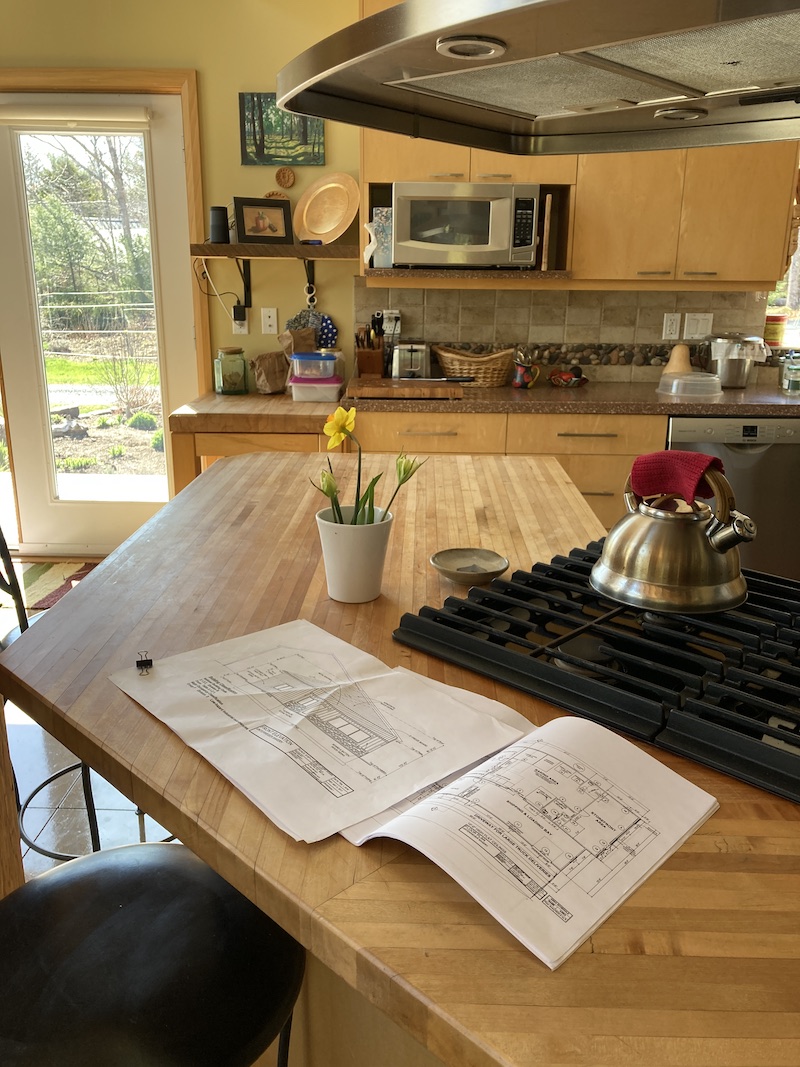
My dad's work in the place of my mom's work
Over the years, we asked ourselves where we wanted to live after our commitment to our children was finished in Montreal. Do we stay here? Can we afford to buy here? Where can we afford to buy?
We considered moving back to the mountains of the Gaspé, an area we love. We thought about the Eastern Townships. We looked in the Laurentians.
If an international border did not divide us from Northern Vermont, all things being politically and economically equal (which they are not), I would have purchased there in a heartbeat. Since moving to southern Quebec, I discovered a place I would love to call home on my trips across the border to the better mountains.
Nothing felt right to both of us. And the time hadn’t yet come for us to direct our effort and resources into a more refined search.
And so the question of where we would go remained unanswered, bothering me more than Damien.
As we considered our options and talked about our realities, another piece of the puzzle started to take on more significance than it had in the past, my relationship with my parents and my responsibility to them.
Relations, Social Capital & Constitution
I had decided some years back that when my parents reached the life stage where they needed help for daily living, I wanted to be that person. Care for my parents is not something I was raised to feel obligated to provide. And it’s certainly not part of modern Western cultural expectations. But I knew I did not want my parents navigating their elderly years without the daily support and connection to their children.
Much about North American culture does not reflect my values, and the bureaucratized and institutional care of both young and old is just one of many sources for my cultural dissonance. And when I saw how the institutionalized elderly were treated during the pandemic, my resolve to not be a part of that system only strengthened.
A return to my parents was in the cards for me because of how I’m wired and what I value. But it wasn’t clear to Damien and me where and how that would happen. Would we go to them? Would they come to us?
Then it all became rather obvious.
By virtue of their individual personalities, upbringing and families of origin, generational context as Boomers, their faith and ethics, and couplehood being greater than the sum of its parts, my parents are Community Builders with high social capital. They are more connected to and conscious of the natural and human resources where they live than some of their born and bred Nova Scotian friends.
My parents know people. They connect people to other people. They host the neighbourhood parties. My dad’s work (still going at 69) entirely depends upon community connections. They’re established in a place after uprooting in their mid fifties from where I was raised.
We, on the other hand, live in a francophone province with an increasing political discrimination towards and reduction of resources for the anglophone minority. Wherever we might want to live in this province, other than small pockets of Montreal, would not be a place we could bring elderly anglophones.
We don’t have the same community connections or social capital as my parents.
We’re the adventurers and explorers, the migrators without property. We’ve built flexibility into our lives and our work. We would move to them. We’d sail the boat of our family life into the security of their port.
And the question of what piece of land, what property, what “place” will be our home was settled.
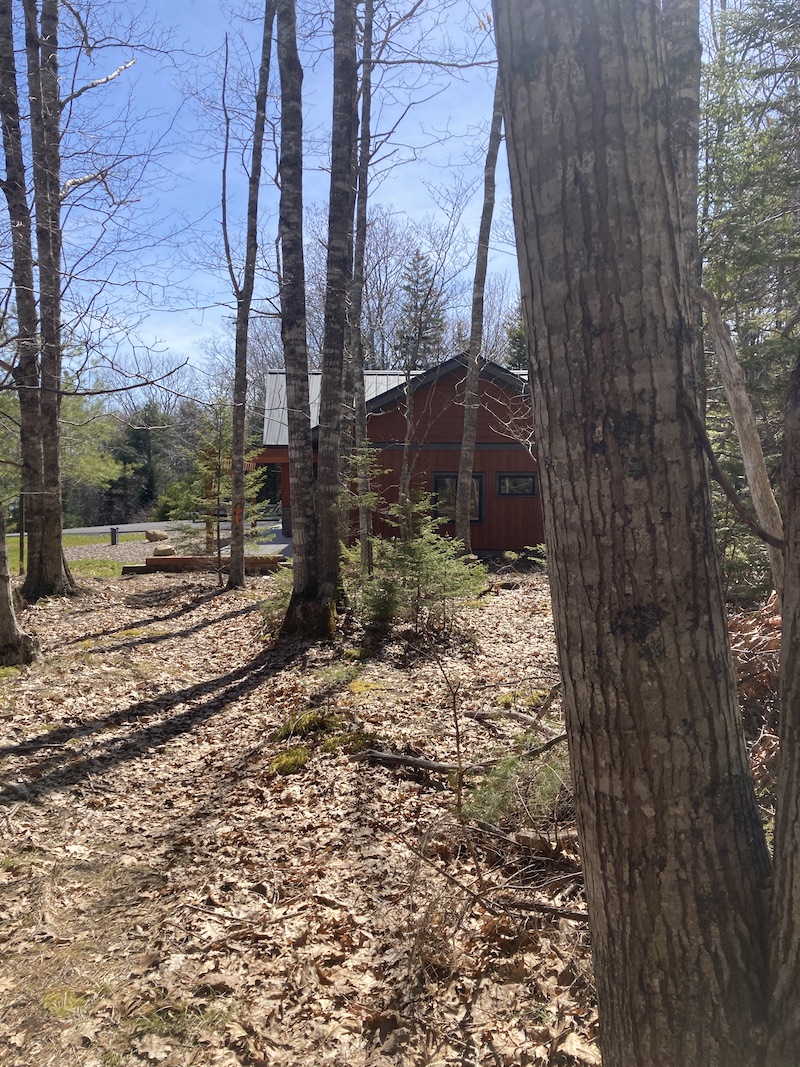
My parent's new house as viewed from the wood's path between the two houses
I have found and experienced home in particular places and land, ideas and beliefs, specific communities, and my own body. But home will always be defined by the people I’m connected to, specifically my children, husband, and parents. These relationships are where I find my most grounded sense of home. It’s always been this way.
Home is where my people are.
As a child, all my people were in one place, and home was easily defined and bounded by those bonds. Then I left and made a life with my husband and children, and my daily and intimate connections with them defined home. They are my home.
I am made into who I am by who I am in relationship with, who needs me, and who I need. There is no “me” or “home” independent of these connections. My relations are most obviously my mate, offspring, kith and kin, but are also land, nature, and place.
I am constituted by my relations and my materiality; by my ideas, personality, and desired ways of being in the world. The places where those things come together, where I embody relationality at multiple levels of human and non-human kinship in ways that align with my ideas, personality, and desired ways of being in the world - all of that is what I call home.
Moving home
Next year when I’m done with my coursework, we’ll move home to Nova Scotia.
My parents subdivided their property, and my dad has already built my parent’s new house to specs that will allow them to age in place. Across the driveway from their new home, Damien and I will take ownership of my parent’s existing home, the one my dad built with all the love, attention, and details you put into your own house, thinking it’s your last build.
I will be moving into a gift on multiple levels.
We’ll be next-door neighbors and ready companions for everything that life has in store for the coming years.
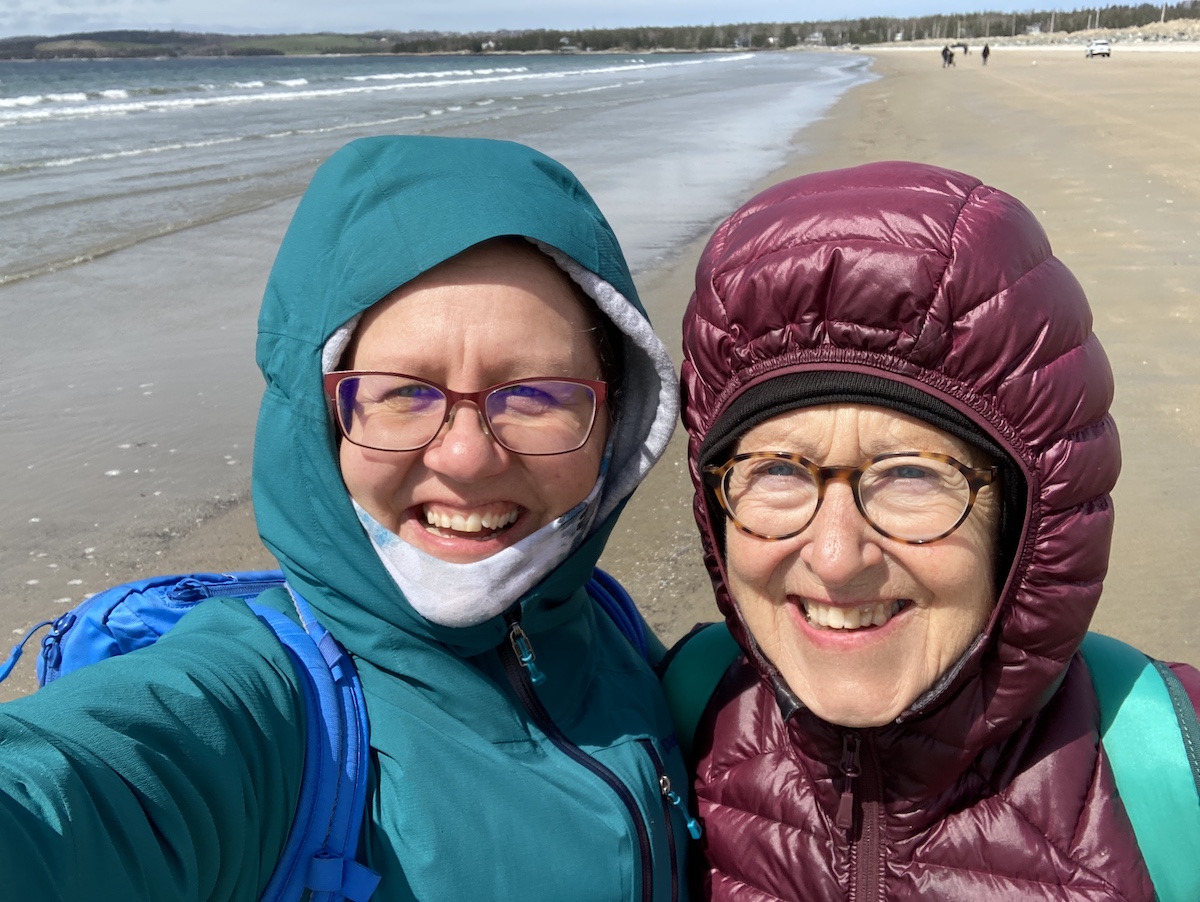
Walking with mom at Crescent Beach, windy spring day
The children, now adults, will remain in Montreal, a city that meets their needs and desires as young adults seeking affordable schooling, work in their fields of interest, and not-yet completely unaffordable housing. Montreal is an excellent fit for who they are, just as we had thought it would be.
For the first time in 25 years, I will no longer have close physical contact with my children. I never thought it would be me that would leave them. After all, it’s the children that go to seek their fortunes elsewhere.
I don’t know how “home” will feel without the children’s steady physical presence.
In the same way that I don’t believe in an inevitable forward and upward movement of human progress and enlightenment, I don’t believe that our individual lives ferry us steadily onward and upward. We cycle. We move in fits and starts, resets and quasi-resets, ups and downs, and loopdeloos.
Having said all that, I believe in bending the arch of our individual and collective development in an overall positive direction, not because it’s inexorable and bound to happen, but because a belief in this direction produces action in this direction. And action produces results. And so I believe to instantiate the possibility.
This next migration is bending the arch of our family story in directions that will shore up familial security, resiliency, and fidelity, the foundation from which future explorations and adventure will undoubtedly be launched.
We circle back. We continue forward. To be with the people who bound my being and constitute my identity is how I want to continue on this journey.
Filed Under
Part of Series
Resource Library
You can subscribe to comments on this article using this form.
If you have already commented on this article, you do not need to do this, as you were automatically subscribed.





